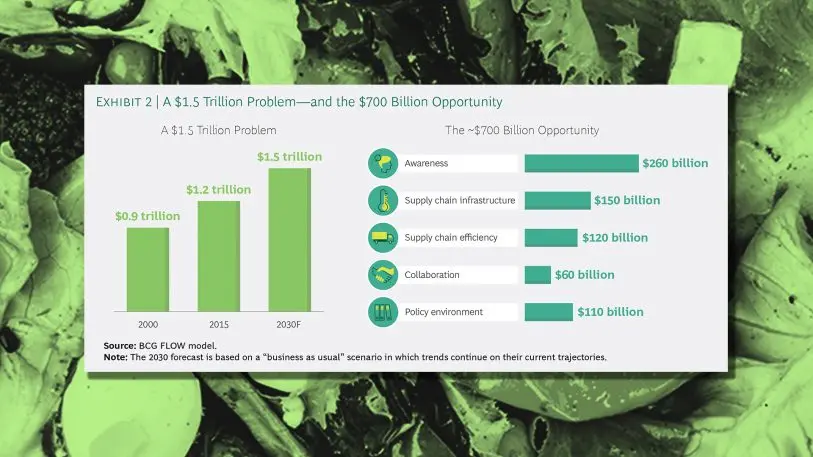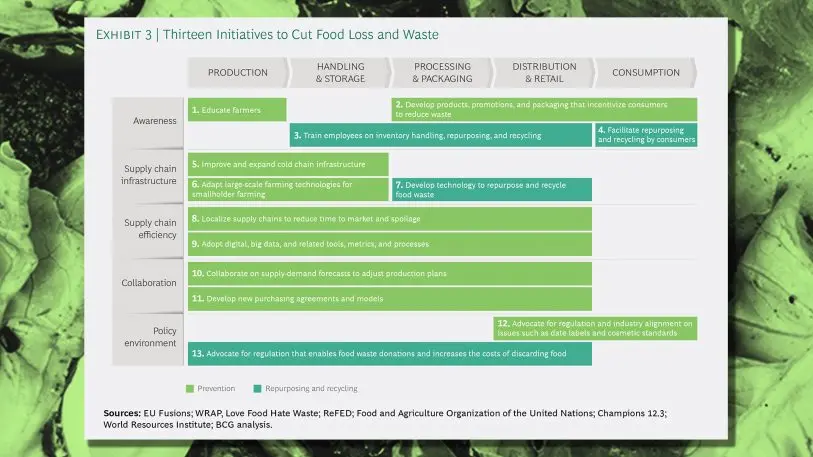Nearly 870 million people in the world are undernourished, but at the same time, approximately one-third of the global food total supply ends up spoiled, thrown out, or wasted. That’s about 1.6 billion tons of edible material overall, and projected to reach 2.1 billion tons by 2030. Plus, there are hidden costs like the greenhouse gasses that come from rotten food, which continue to be a large contributor to global warming.
For some governments, companies, and nonprofits, the inhumanity of that situation has been enough to spur quick action (massively reducing food waste is a sustainable development goal). For others still on the fence, a new report by the Boston Consulting Group has quantified the problem in terms of cold hard cash: The world’s food loss and waste is projected to be about $1.2 trillion per year by 2030.
To create their report, BCG looked at existing research from organizations like the UN’s Food and Agriculture Organization, and World Resources Institute. The group then created its own optimized food system model, which involves expanding innovations and policies across sectors to theoretically stop as much loss and spoilage as possible.

The report finds that with some fixes to the food system, there is an estimated $700 billion in savings available to everyone in the supply chain, from farmers on up. The consultancy doesn’t specify how exactly that correlates in terms of more people fed, but in many cases, these fixes will directly impact developing world communities in dire need of being paid more fairly for what they produce.
To help everyone get started, BCG has identified five key “drivers” or stops along path from food production to consumption, along with 13 different initiatives that can help during different circumstances. The needs of those involved in handling and storage, for instance, differ from those in processing and packaging, or distribution and retail. Either way, the most costly basic driver is still a “lack of awareness,” especially among consumers, food service providers, hotels, and restaurants about how modifying their behavior can radically change the entire system.

According to the report, the four other major drivers are inadequate “supply chain infrastructure” (for example, not enough food stays cold during shipping), problematic “supply chain efficiency” (including a lack of dynamic pricing to account for shifts in supply and demand) a weak “policy environment” (few regulations, along with few incentives like taxes or certifications to change production-geared food-wasting habits), and a generally poor collaboration among all players in the field (the “absence of well-designed agreements” between farmers and processors, for instance, can cause farmers to harvest early in a race for cash, leading to lower yields and lower quality crops).
BCG estimates that lack of awareness alone causes at least $260 billion in losses among food chain participants annually. “[People] often think that meats, fish, fruits, and vegetables are healthier when fresh than when frozen,” the report notes. That’s not necessarily true, plus, it leads to higher transport costs, more spoilage along the way, and goods with a more limited shelf life.
At the same time, not all processors are adopting food preservation innovations like packaging that extends shelf life, in-store campaigns that popularize (and discount) “imperfect” fruits and vegetables, or buy-one, get-one-later campaigns that allow deal-driven shoppers to pick up bonus goods at a time when they know they’ll use it.
BCG offers plenty of other suggestions to improve logistics (and hopefully start saving lives). One big untapped opportunity is to borrow a tactic from the fair-trade playbook, and create a widely recognized “food waste reduction ecolabel.” That could unify many of these practices under an audited seal, pressure more industry players to make changes, and certainly generate more discussion.
Recognize your company's culture of innovation by applying to this year's Best Workplaces for Innovators Awards before the extended deadline, April 12.